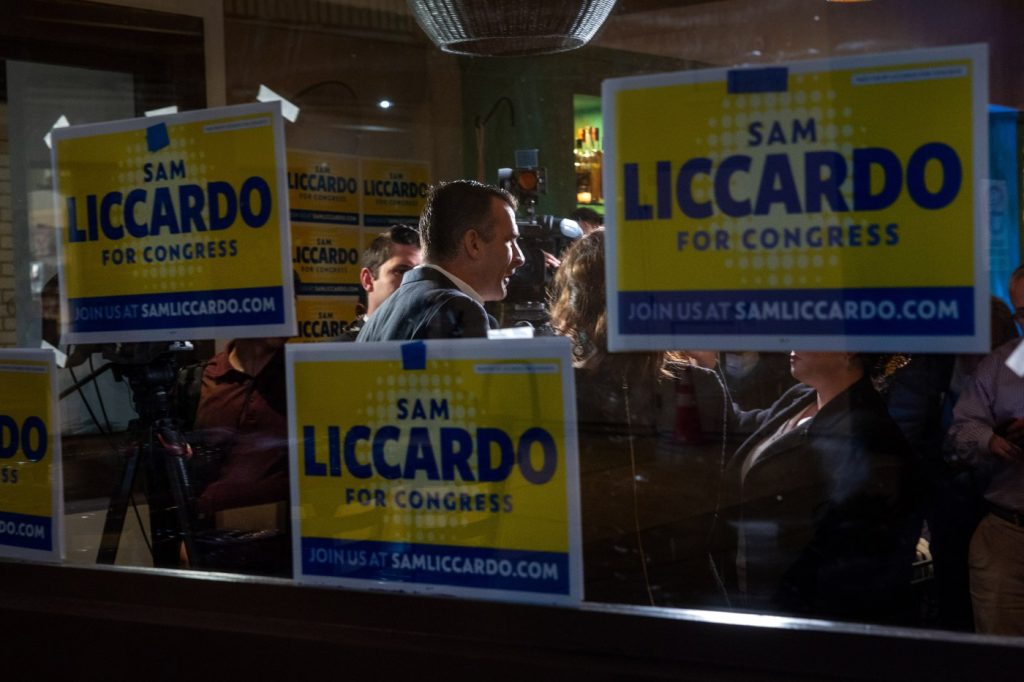With California’s 16th congressional district election already the most expensive House race in the state’s primary, money could once again prove to be key as voters look toward November to decide which of the three candidates left battling should replace U.S. Rep. Anna Eshoo.
Former San Jose Mayor Sam Liccardo has emerged as the front runner in the race, while Santa Clara County Supervisor Joe Simitian and state Assemblymember Evan Low are jockeying for the second spot in the general election, according to the latest election results.
If Liccardo remains in the lead, he’ll start the runoff with a huge advantage as he still had $1.2 million in campaign cash as of Feb. 14 — more than double what Simitian had on hand, and more than triple what Low had left at the last reporting deadline.
The former mayor has been known to be a prolific fundraiser — and unlike either of his likely competitors, has not loaned his campaign any money. Simitian loaned his campaign $250,000 late last month, and Low loaned himself roughly $13,000 early on.
Glossy mailers overflowed in mailboxes and TV ads filled the airwaves touting candidates in the 16th district race over the last several months. But Melissa Michelson, a political science professor at Menlo College, said that while money gives a candidate the ability to impact the election, “it can only take you so far.”
“It opens the door, but the voters are not going to walk through if they don’t like you once they learn a little bit more about you,” she said. “But if you can’t even get them to open the door because you don’t have money to advertise, then they’re definitely not going to vote for you.”
Independent expenditures could play a role, too. In the primary, Super PACs and outside groups spent more than a half a million dollars each to back Liccardo and Low, while a Super PAC backing Simitian shelled out $247,785.
But for now, voters still await the final election results.
Local political analysts had predicated that the crowded race to replace Eshoo would be a close one — especially given the relatively short campaign season that kicked off in late November when the congresswoman announced her retirement. And by Wednesday morning, voters in District 16, which includes roughly 735,000 residents in parts of Santa Clara and San Mateo counties, still didn’t know which two names would appear on their November ballots.
It could be days before that’s solidified. The Associated Press, which has become the gold standard for calling elections, had yet to anoint the two victors on Wednesday afternoon and estimated that only 51 percent of the votes had been counted.
Wednesday morning, the Santa Clara County Registrar of Voters said it had counted 182,413 ballots and still had about 145,000 to count, excluding mail-in ballots that haven’t arrived. Not all of the outstanding ballots, though, fall within District 16. The San Mateo County Registration and Elections Division did not return calls on Wednesday about how many votes still needed to be tallied.
Michelson said that election watchers probably are “torn between wanting to know the outcome and letting the counting take its course.”
“I think we all got spoiled by the old processes where we would pretty much know the results on election night, but now that we’ve allowed for ballots to be postmarked by Election Day instead of arrived by Election Day, we’re all still learning to be patient and let all those votes be counted,” she said.
Shortly after 10 p.m. on election night, Simitian declared victory for himself, saying that he was “entirely confident” that he was in the top two for the November election.
Low, however, isn’t ready to bow out.
“With numerous votes outstanding, the election remains too close to call,” the assemblymember said in a statement sent to reporters late Tuesday night. “I look forward to reviewing the results of the remaining votes as they come in, and remain hopeful we will continue to the General Election.”
In any interview, San Jose State University political science professor emeritus Larry Gerston questioned Simitian’s decision to call the race.
Gerston said that if the remaining half of the votes that are still out there aren’t representative of the first half, it could spell trouble should the race swing the other way.
At this point, the local political expert said there’s no way to know what has yet to be counted. In low turnout elections like this one though, Gerston said white men tend to vote disproportionately more than other groups, which could sway in Liccardo and Simitian’s favor.
“We are in no man’s land on this issue until we get more votes,” he said. “When you’re talking about that small of a margin between Simitian and Low, and probably a shave more between Simitian and Liccardo, and probably about 5,000 votes separating them all, good grief. Anything could happen.”


